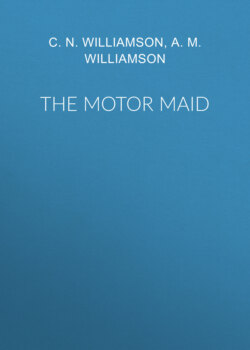Читать книгу The Motor Maid - C. N. Williamson - Страница 5
На сайте Литреса книга снята с продажи.
ОглавлениеThe waiter roared it through the hall:
"We don't give bread with one fish-ball!
We-don't-give-bread with one fish-ba-a-ll!"
I half expected some such crushing protest, and it was only when the weary duke had turned his back, presumably to execute my order, that I sank into my chair with a sigh of relief after strain.
Just at that moment I met the eye of the lady of the lift, and when the waiter reappeared with a small cup, on a charger large enough to have upheld the head of John the Baptist, she looked again. In five minutes I had finished the consommé, and it became painful to linger. Rising, I made for the door, which seemed a mile away, and I did not lift my head in passing the table where the lady sat behind her roses. I heard a rustling as I went by, however, a crisp rustling like flower-leaves whispering in a breeze, or a woman's silk ruffles stroking each other, which followed me out into the hall.
Then the pleasant voice I had heard near the lift spoke behind me:
"Won't you have your coffee with me in the garden?"
I could hardly believe at first that it was for me the invitation was intended, but turning with a little start, I saw it repeated in a pair of gentle gray eyes set rather wide apart in a delicate, colourless face.
"Oh! thank you!" I hesitated. "I—"
"Do forgive me," went on the lady, "but your face interested me this morning, and as we're all rather curious about strangers—we idle ones here—I took the liberty of asking the manager who you were. He told me—"
"About the Princess?" I asked, when she paused as if slightly embarrassed.
"He told me that you said you had come to Cannes to be her companion. He didn't tell me she was dead, poor woman, but—there are some things one knows by instinct, by intuition, aren't there? And then—I couldn't help seeing, or perhaps only imagining, that you looked sad and worried. You are very young, and are here all alone, and so—I thought perhaps you wouldn't mind my speaking to you?"
"I'm very grateful," I said, "for your interest. And it's so good of you to ask me to have coffee with you." (I was almost sure, too, that she had hurried away in the midst of her luncheon to do this deed of kindness.)
"Perhaps, after all, you'll come with me to my own sitting-room," she suggested. "We can talk more quietly there; and though the garden's quite lovely, it's rather too glaring at this time of day."
We went up in the lift together, and the moment she opened the door of her sitting-room I saw that she had contrived to make it look like herself. She talked only about her books and photographs and flowers until the coffee had come, and we seemed better acquainted. Then she told me that she was Lady Kilmarny—"Irish in every drop in her veins"; and presently set herself to draw me out.
I began by making up my mind not to pour forth all my troubles, lest she should think that I wanted to take advantage of her kindness and sponge upon her for help; but she was irresistible, as only a true Irishwoman can be, and the first thing I knew, I had emptied my heart of its worries.
